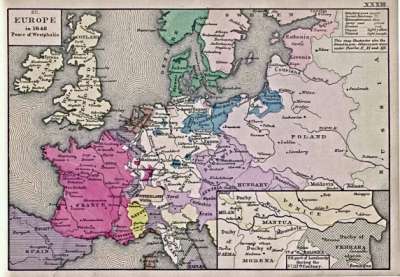| Wars
in central Europe between Roman Catholics and Protestants, concluding
the Era of Reform. |
 |
|
|
This series of four
related wars, known collectively as the Thirty Years' War, began as religious
conflict but soon became a cauldron of political ambition. After bringing
great devastation to Germany, the war ended with the Peace of Westphalia
in 1648, a date commonly used to mark the end of the Era of Reform. The
Peace of Westphalia defined the religious boundaries of Europe for some
time to come. It recognized some regions as firmly Protestant, while Austria
and Bohemia remained firmly Catholic. Under the treaty, German Calvinists
secured the legal right to exist but radical Protestants did not. The
overall principle was "territorialism." In this strategy for dealing with
rival religious claims, secular rulers determined the religion to be followed
within their domains as expressed in the slogan cuius
regio eius religio: "whose the realm, his is the religion." Exceptions
were made for territories that had more than one religious party before
1624, provided those groups did not expand. The suffering inflicted by
the war convinced many people that armies could not solve religious differences.
A new strategy, toleration, was soon articulated by John
Locke.
|